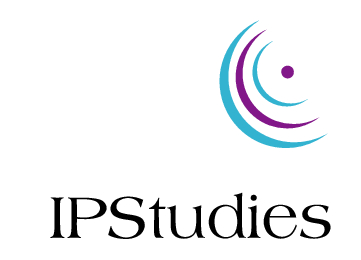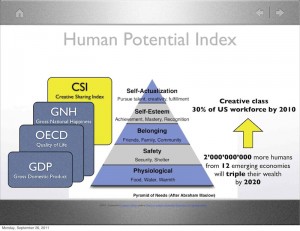The Economist-Innocentive challenge has inspired at least one other published initiative according to my google search: the Continuum Development Index. Interestingly, the author, Brandon Peele, also started from the pyramids of needs by Maslow. While I specialized my proposal on the creative sharing measurement as the best proxy to self-actualization I could think of, Brandon took a larger view by trying to define a framework encompassing many more areas of our needs, and also taking into account the trans-generational transmission.
This trans-generational part caught my attention. I had been thinking myself about the need to account for time in the creative sharing metrics – a problem that is well known in reference-based patent analytics, as it takes often more than ten years to gather statistically relevant forward referencing data to a given patent application. And that is even more relevant to capture the influence of an innovation into our human communities. I left it aside to stick to the 4 pages requirement from the Innocentive challenge, but this needs to be addressed. As knowledge communication becomes a commodity (remember wikipedia was only started 10 years ago!), I am confident it should possible to measure the spread of an innovation knowledge (and improvement, as relevant) without having to wait for decades to collect evidence, but this now needs to be validated on real data.
In my search on HPI, I also noticed a number of initiatives focus on measuring well-being. This sounds a bit strange to me, in my naive and idealistic view of the world; for me measuring Human Potential has something to do with measuring our purpose, that is why we are here, not just how we feel about it. In that sense, GDP was a good proxy to measuring purpose in a society where there were not so many goods available to increase the physical comfort of people (remember that fridges were still a luxury 60 years ago!). But that accumulation of goods is non-sense for Generation Y people who grew up overloaded by Christmas and birthday presents and everyday gadgets (and even for many of the earlier Generation X like me). The social competitiveness index, the happy planet index, various environmental and sustainable measures as well as metrics focusing on health and education fit better in today’s search for a higher purpose than the accumulation of goods and wealth.
And I still think we need to be even more ambitious. Considering that
- “we are what we measure”, to quote a nice recent paper by Matthew Bishop and Michael Green,
and that
- we need to be more creative as human beings to solve all those social and environmental problems we have to face now, according to the media
well… we have to measure our creativity as a species in a better way.

